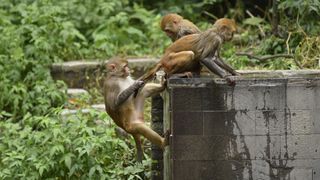
Mindy Weisberger
Mindy Weisberger is a science journalist and author of the book "Rise of the Zombie Bugs: The Surprising Science of Parasitic Mind-Control," published by Hopkins Press. She formerly edited for Scholastic and reported for Live Science as a channel editor and senior writer. She has reported on general science, covering climate change, paleontology, biology and space. Mindy studied film at Columbia University; prior to Live Science she produced, wrote and directed media for the American Museum of Natural History in New York City. Her videos about dinosaurs, astrophysics, biodiversity and evolution appear in museums and science centers worldwide, earning awards such as the CINE Golden Eagle and the Communicator Award of Excellence. Her writing has also appeared in Scientific American, The Washington Post, How It Works Magazine and CNN.
Latest articles by Mindy Weisberger

A woman heard a 'pop' during Pilates class. Her spine had sprung a leak.
By Mindy Weisberger published
A woman developed awful headaches after a Pilates class, and their underlying cause was very unusual.

Cancer: Facts about the diseases that cause out-of-control cell growth
By Mindy Weisberger published
Learn facts about cancer, in which abnormal cell growth destroys healthy body tissues.

Diagnostic dilemma: Virus caused a man to have hiccups for days on end
By Mindy Weisberger published
In an unusual case, a man's multiday bout of hiccups was triggered by a respiratory infection.
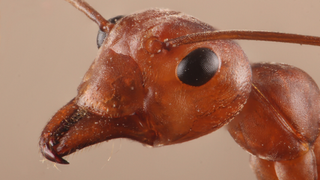
'The parasite was in the driver's seat': The zombie ants that die gruesome deaths fit for a horror movie
By Mindy Weisberger published
"Once the egg hatches, the ant has only a few weeks of life before it succumbs to the manipulations of its attacker, stumbling away from its home and family and then undergoing decapitation from the inside out."

Flu: Facts about seasonal influenza and bird flu
By Mindy Weisberger published
Learn interesting facts about the flu, a viral infection that targets the respiratory system.

Diagnostic dilemma: A fish bone wandered through a man's abdomen and stabbed his liver
By Mindy Weisberger published
A man went to the hospital several times with gut pain and a fever — and it turned out that his relatively common symptoms had an unusual cause.

Diagnostic dilemma: Speed eating a 7-pound burger sent a man to ER unable to pass gas
By Mindy Weisberger published
A case report highlights one potential danger of competitive speed eating.

Diagnostic dilemma: Teen's improbable pregnancy occurred after oral sex
By Mindy Weisberger published
A teen girl with abdominal pain learned she was pregnant and had conceived under extremely unusual circumstances.

Diagnostic dilemma: One Direction concert left teen with 'crackling' bubbles in her chest
By Mindy Weisberger published
In what doctors called an "extraordinary" case, a teenage girl developed several rare conditions after attending a pop concert.

Diagnostic dilemma: A man ended up in the ER after drinking 6 gallons of milk in 2 days
By Mindy Weisberger published
A man experiencing excessive thirst drank lots of milk, with dangerous consequences.
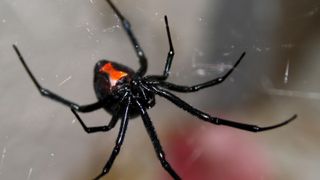
Diagnostic dilemma: A woman injected herself with venom from a black widow spider
By Mindy Weisberger published
Most exposures to black widow spider venom are accidental, but in a rare medical case, the exposure was intentional.

Diagnostic dilemma: A woman's nut allergy was triggered after sex
By Mindy Weisberger published
A woman with a known nut allergy had a severe allergic reaction after sex, even though her partner bathed and brushed his teeth first. Here's why.

Diagnostic dilemma: A surgeon accidentally transplanted a tumor into his own hand
By Mindy Weisberger published
In an unusual case, a surgeon developed a cancerous lump on his hand that stemmed from an injury he sustained while performing surgery.

Diagnostic dilemma: A man's penis was turning to bone
By Mindy Weisberger published
A man in his 60s went to the emergency room after a fall and ended up being diagnosed with a rare disorder of the penis.

Diagnostic dilemma: A woman got 'broken heart syndrome' after eating too much wasabi
By Mindy Weisberger published
The patient was diagnosed with takotsubo cardiomyopathy, also known as "broken heart syndrome," which had an unusual cause.

Body parts grown in the lab
By Mindy Weisberger, Emily Cooke last updated
In recent years, scientists have successfully grown a range of miniature organs and human body parts in the lab.

How many galaxies orbit the Milky Way?
By Mindy Weisberger published
The number of known galaxies circling the Milky Way is increasing as we develop new powerful telescopes.

How many times does a heart beat in a day? What about in a lifetime?
By Mindy Weisberger published
Celine Dion sings that "my heart will go on," but how many times does it actually beat in a day or even a lifetime?

Tardigrades: Facts about one of the hardiest animals on Earth, and beyond
By Mindy Weisberger last updated
Reference Tardigrades, often called water bears or moss piglets, are near-microscopic animals that are extremely resilient.
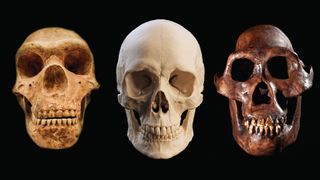
Why did Homo sapiens outlast all other human species?
By Mindy Weisberger published
What's the secret to Homo sapiens' success as a species?
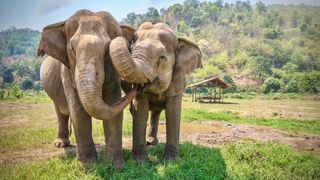
Do animals have friends?
By Mindy Weisberger published
Friendship is a key component of human social relationships. Is this also true for animals?

How to make a solar eclipse viewer to safely watch the total solar eclipse on April 8
By Mindy Weisberger last updated
Don't have a pair of eclipse glasses to view the April 8 total solar eclipse? No sweat; you can make a safe and simple DIY eclipse viewer with a box, some tinfoil, and a few household craft supplies.
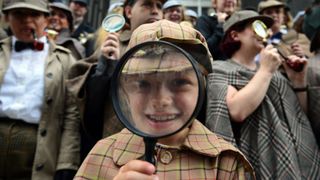
What's the difference between deductive reasoning and inductive reasoning?
By Alina Bradford, Mindy Weisberger, Nicoletta Lanese last updated
Deductive reasoning and inductive reasoning are easy to mix up. Learn what the difference is and see examples of each type of scientific reasoning.
Get the world’s most fascinating discoveries delivered straight to your inbox.
